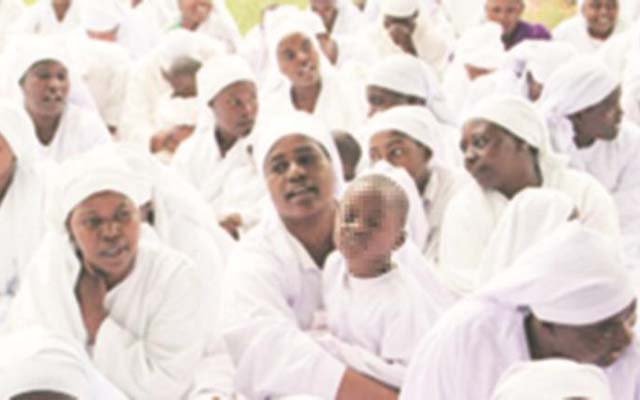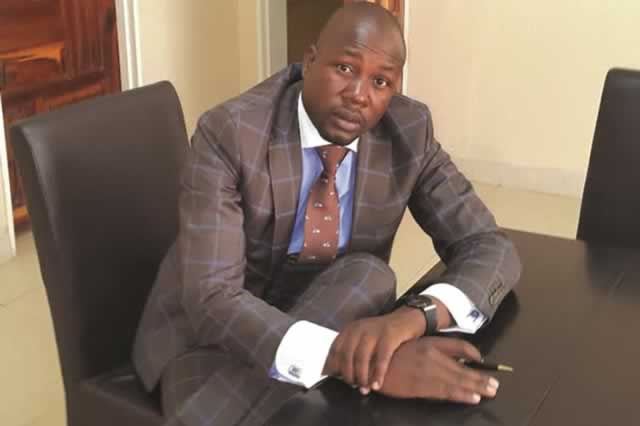Dilemma of living with a Muramu


Members of the Johane Marange Apostolic Church can easily be identified by their white robes, men with shaved heads and women with white veils or doeks and worshipping in open spaces
Dr Sekai Nzenza on Wednesday
John Marange’s followers were mainly the downtrodden poor peasants, suffering from the early problems of racism, chibaro or forced labour and land dispossession.
The beautiful 20-year-old niece called Mutsa is still at my cousin Reuben’s house. She has been there for more than two weeks now. Mutsa is staying in a nice room several doors from Reuben. Here she can study to rewrite two subjects that she failed in Form Four.
Mutsa’s parents belong to the Johane Marange Apostolic Church. This church continues to grow rapidly in our village and beyond, going all the way to Bocha and to Marange where it first started. Today, you will see so many of the followers clad in white robes, men with shaved heads and women with white veils or doeks going to worship in open spaces.
New converts in our villages sometimes think this church started after independence. But they are wrong. The Johane Marange church has a long history.
Back in 1912 when the British South Africa Company led by Cecil John Rhodes was well settled in the colonisation mission of Southern Rhodesia, a man called Muchabaya Momberume was born near Bondwe Mountain in Marange. His father’s name was Fuleni and he worked for the chief, Mambo Marange.
Then he fell in love with the chief’s daughter called Mufarikwa. That union gave birth to a number of children including sons called Arnold, Cornelius and Muchabaya. But Fuleni was a poor man with no cattle to pay lobola. Chief Marange and Fuleni then agreed that the young boy called Muchabaya would be adopted by the chief as payment for lobola.
That’s how the boy adopted the name Muchabaya Marange. When Muchabaya was five years old, he was responsible for herding cattle, just like any other village boy. Then one day, while herding cattle out in the valley, he started speaking in tongues. People who knew something about the Christian religion said the boy was possessed by the Holy Spirit. At that time only the European missionaries and a few converted Africans preached and talked about the Christian God, who was different to Mwari, the God that Africans worshipped through the ancestors. From that time onwards the boy’s name was changed from Muchabaya to John the Baptist.
As he grew, John Marange started preaching a different version of Christianity from that of the European missionaries. His followers were mainly the downtrodden poor peasants, suffering from the early problems of racism, chibaro or forced labour and land dispossession.
John Marange was a humble man with strong leadership skills. He appointed numerous relatives to the church’s hierarchy and developed a powerful apostolic movement which became the largest indigenous African church in Southern Rhodesia. For 30 years he travelled mostly on foot through Rhodesia and neighbouring countries of Botswana, Zambia, Malawi, South Africa and as far as north as Zaire.
One story says as far back as 1920, John Marange prophesied that white settlers would be defeated and this country would become independent. John’s Marange’s prophetic words came true in 1980.
After his death in 1963, his sons, Abero, Makebo and Judah Marange took over leadership of the church. Today, the Johane Marange church remains a big movement with many followers mostly in Zimbabwe, Congo and across many parts of Southern Africa.
Mutsa’s father, Madzibaba Ishmael, joined the church in the early 1980s and has since married seven wives. He has many children. Some of the children died due to various diseases or at child- birth. Mutsa’s mother and the wives of her father do not go to hospital for child birth, immunisation or for treatment of diseases. According to Madzibaba Ishmael, God heals with miracles and there is no need for tablets or injections.
I recall meeting Madzibaba Ishmael a few months ago and he had a towel wrapped around half his face because his cheek was swollen from a very badly infected tooth. I joked with him, saying the tooth needed the tools of a dentist to fix it. He simply smiled and said, “Zvinoda munamato. Mwari vachapindira.” All you need is prayer. God will intervene.
When I saw him recently, he looked happy and healthy. He said God’s miracle hand finally came and healed his tooth. I asked why God had taken so long to heal his son Samuel, who died last year of fever at the age of two. There was no real answer to my question and I did not probe further. In our village, we sometimes talk about these troubling aspects of religion but we do nothing. Instead, you will see us drinking sweet tea with Madzibaba Ishmael and some of his wives, talking and laughing like there is no problem at all.
Experience has taught us that some interventions are important where gross injustice is happening. If these interventions are planned well, with support from NGOs and the government, then there is success. But we must also accept that we cannot change how people think. People have a right to make informed choices.
In Mutsa’s case, she looks comfortable now, living as a muramu in Reuben’s big house. It is a better place to live than to be wife number three or four back in the village.
Mutsa really likes Reuben and we can all see that this could be a dangerous situation if Reuben does not control himself as good men should do. Mai Tinashe, Reuben’s wife living in Australia, says Mutsa must move out of the Borrowdale house now. It is not safe for a girl her age to share a house with a man who is temporarily on his own.
My cousin Piri does not agree with Mai Tinashe. “Aika, Mutsa is a muramu. In our culture, muramu looks after Babamukuru and vice versa. Reuben has five bedrooms on his own and no maid. Why should Mutsa not stay with him?” Piri asked. I shook my head, not knowing what to say.
Reuben is feeling more and more uncomfortable living with Mutsa. “What if people say I am having an affair with her?” he asked me. I said it would be ridiculous for anyone to think like that. Reuben was a married man and it would be unfair for him to even consider taking advantage of the young girl.
I was being rational, though I know that Reuben is a man and temptations do happen. Mutsa was not making the situation any easier for Reuben. She was taking the muramu role very seriously. Some girls do that, especially where they see a future different to the one that they had been destined to back in the village.
I recall how we young village girls used to run a mile whenever Babamukuru Nhau, husband of Tete Emma, chased after us, asking to take a closer look and comment on the size of the budding breasts. Tete Emma looked on and encouraged us to stop and let him have a look or even a feel.
One time he got hold of Rita, the oldest among us. She screamed but not with fear and he kept on holding her down, standing so close behind her. When he let her go, she laughed and he casually commented that she was almost getting ripe for marriage. Every time Babamukuru Nhau came over to the village homestead, we saw Rita getting all coy and flirtatious towards him and he gave her more attention. In those days, it was fine for Babamukuru Nhau to chase and even (responsibly) touch his muramu. But he knew where to stop.
This practice of “chiramu” was meant to help us enjoy the praise and admiration from older men. Babamukuru Nhau demonstrated to us the image of a traditional good husband. He also made us feel beautiful, confident and wanted. He teased us a lot, telling us that he would chase any man who dared to come near us because we were all his wives.
“When you took Mutsa from her parents in order to educate her, you should have known that she could easily become your second wife,” said Piri. Reuben said Piri was living in the past.
“Mutsa, like every other girl child has a right to grow up without being abused or forced to marry when she is still a child. The law says that the minimum age for marriage should be 18 years. We had to help Mutsa and support her education. Now she is free to marry whosoever she wishes,” said Reuben.
“But, Mutsa likes you,” said Piri. “How are you going to tell her to leave and go back to the village? Madzibaba Ishmael will soon marry her off to a man in the church or simply chase her away because she has dishonoured him by leaving the village.”
“Help me to find a solution,” said Reuben, looking at me as if I knew the answer.
“Just draw the boundaries,” I said, though I was not convinced such advice would work, when an ordinary man is confronted with close temptation. But he must resist, because if he fails, someone will cry.
Dr Sekai Nzenza is a writer and cultural critic.










Comments